- Home
- J. G. Ballard
The Day of Creation Page 7
The Day of Creation Read online
Page 7
While I worked with my spade, I noticed that Sanger was listening intently to Mr Pal. The slim-shouldered Indian stood beside the beached skiff and kept up his endless commentary, now and then glancing at me in a knowing way, as if I had already suggested to him the germ of a new wild-life programme, perhaps on the subject of amateur dam-building. Even Miss Matsuoka had begun to point her camera at me when she had no other subject in view. I was all too aware that this intense young Japanese saw me as one of the odder denizens of the forest.
Irritated by this air of small conspiracy, I threw the clods of earth at their feet.
‘Sanger – tell Miss Matsuoka to aim her camera at someone else.’
‘You’re careless of life, doctor.’ Sanger instantly came forward when he saw that I was waiting for him to go. ‘Like all your profession, you dismiss everything that doesn’t fit into some punitive scheme of things. That’s why the public venerates you.’
‘Why don’t you leave Port-la-Nouvelle? There’s nothing here for you.’
‘There’s nothing for me anywhere else.’ Sanger shrugged, with one of the displays of frank despair to which he often treated me, as if testing me in some way. ‘I’m waiting for funds to be telexed. I need to lease a big plane for the rice. People don’t realize what all this charity weighs.’
‘Then leave the rice here. Go to Gambia, make a tourist documentary about crocodiles.’
‘It’s been done too many times. The natural realm is exhausted, everyone got there first in the sixties. Nobody wants to know how the world is, they want emotion and imagination rolled across it like a soft carpet. Believe me, Dr Mallory, you need new ideas these days. Just as we need new vices.’
‘What you really need is a new set of lies.’ I said this without malice – in an unexpected way, I found myself drawn to this amiable imposter. I thrust at the oozing mud between my feet. ‘Still, that shouldn’t be too hard to find.’
‘Very hard.’ Sanger held my shoulder, oblivious of the flecks of mud on his suit. ‘You are wrong again, doctor. Television doesn’t tell lies, it makes up a new truth. In fact, the only truth we have left. These sentimental wild-life films you despise simply continue that domestication of nature which began when we cut down the first tree. They help people to remake nature into a form that reflects their real needs.’
‘And that justifies any invention?’
‘No. It must chime with their secret hopes, their deep-held belief that the universe is a kindly place. Besides, everything is invented and then pondered upon. God rested on the seventh day in order to look at the rushes. These trees, these leaves, flowers and roots, are fictions invented to trap the sun, catch an insect, suck the water. Look at your river – that’s a complete invention.’
‘A television company might even have thought it up?’
‘Perhaps it did. And what difference? Sooner or later, everything turns into television. Consider, Dr Mallory, you may already be the subject of a new documentary about a man who invents a river …’
A cascade of gravel fell on to the bank beside me, splashing into the water at my feet like the pellets of a shotgun. The sharp stones stung my arms and neck, and I dropped my spade into the mud. I turned to see the Japanese photographer standing above me on the crumbling face of the runway, the stone chips falling from her flight boots. She had listened to Sanger and now fixed me in the viewfinder of her camera, already accepting that I was her new project.
Sanger was kneeling at the water’s edge, filling his flask as Mr Pal pushed the skiff into the stream. The clear liquid poured into the chromium flask, its silvery reflection dancing happily in its private vault. Sanger wet his hands, and then raised his sunglasses and bathed his tired eyes, as if they had already seen enough of my real motives.
‘Sanger …’ I picked up the spade and struck the earth wall at my feet, sending a shower of wet mud through the air. ‘Leave that water. And get out!’
‘Of course, doctor.’ Spattered with the mud, Sanger stood up, searching for Mr Pal’s shoulder. ‘I should have asked for your permission. It is your river.’ With a formal bow, Sanger decanted the water into the stream. He wiped the neck of the flask on his sleeve and then allowed Mr Pal to help him into the skiff.
With an effort, I controlled myself, listening to the rapid clicks of Miss Matsuoka’s motor-drive. What had annoyed me, I realized as Sanger sailed upstream, was not the thought of being filmed, even by some imaginary programme inside his head; rather, I had been angered by his taking of my water. Much as I was trying to stifle the stream, or point it in some other direction, preferably north, I now regarded every drop it contained as my own.
9
The River Mallory
Spade in hand, I set off along the bank. I was certain that Sanger was deliberately stealing the water, not merely to boil his rice, but in some way to subvert my own image of the stream, and to trivialize my awakening sense of that richer world I had glimpsed in the forest. As if reassuring me, the bright waves rushed towards my feet, tumbling over a cascade of truck tyres that lay on the sandy bed.
As I waded through the shallows, following the trail of bubbles left by Mr Pal’s punt pole, I saw the skiff pulled up on to a beach of red sand. Sanger knelt with his flagon, helping himself to the current.
Twenty yards upstream, a second watering-party had arrived. Mrs Warrender and two of her servant-women stood knee-deep in the water, skirts fastened around their bare thighs. They had brought with them a wooden cart, to which a fifty-gallon drum was lashed with copper wire. Scanning the stream for the clearer currents free of leaves and dead insects, they filled their ladles with water and emptied them into the drum. While they worked in this leisurely but efficient way they were watched by Mr Pal, who framed his fingers to form a camera viewfinder, recording this pastoral glimpse of the sisterhood under the sign of Aquarius.
I, in turn, was watching Nora Warrender. She held the handle of the cart in her firm grip, and gazed across the river at two of Kagwa’s soldiers who were bathing by the opposite bank. Between them, moored in midstream to the branch of a collapsing beech, was the twelve-year-old with the injured foot. She had built a small coracle by stretching green plastic sheeting over a frame of bamboo. One foot over the side, she played with her bandage as it unravelled in the flowing stream.
Mrs Warrender ignored her, and watched the naked men sedately soaping themselves behind the veil of beech leaves. Her strong face was set in an expression of stony hostility. I assumed either that this was the racist response of a former white Rhodesian, or that she had recognized a former guerilla who had killed her husband.
‘N’doc …’ There was a soft grunt of alarm. Noticing me, the girl sat up and reeled in her bandage. Using a home-made paddle, she moved swiftly across the stream and stationed herself a few yards from the women. Eyes fixed on me, she whistled to the water, as if urging the river to be alert, spurring it on with encouraging strokes of the paddle.
‘Mrs Warrender … I meant to warn you.’ I strode past Sanger, aware of my mud-caked hands and legs, and the wild smears on my face. ‘I take it you aren’t drinking this water?’
She turned to face me, looking me up and down with the same expression that I had seen as she gazed at the soldiers. ‘Why not? It seems pure enough. Doctor …?’
I caught my breath, aware of the half-naked bodies and heavy perspiration of the women, and unable for a moment to think of an answer. ‘All this water – it’s part of the Lake Kotto irrigation project.’
‘Fair enough. I’m glad to see it irrigate Lake Kotto. There’s plenty left over for the rest of us.’
‘No …’ I gestured to the African women to stop ladling, but after the barest glance they ignored me. ‘It may well be infected. Nora, it’s best to leave it alone.’
Nora Warrender stared at me in a sympathetic way, shaking her head. ‘It’s infected you – I can see that straight away. God only knows with what strange virus …’
She bent down to fill her lad
le, the loose lapels of her dressing-gown exposing her breasts. She dressed in this offhand manner, though not out of coquetry. By casually revealing her body, she was telling me in the most matter-of-fact way that I did not exist.
Irritated by all this, I seized the ladle. Her arm pressed against mine, and I felt the tension of a fierce body inside the shabby bath-robe.
‘Nora … This water may not be safe – there are bodies buried here.’
‘Don’t be a fool. You don’t own this river …’
We struggled together around the cart, bumping into the African women, who turned and began to shout at me. The water leapt from their ladles, drenching my shirt. I lost my footing in the wet sand, slipped and fell on to my back in the stream. Instantly the girl in the coracle paddled forward. With a flick of her oar she pivoted the small craft and churned the water over my legs, as if trying to bury me.
Ladles in their heavy hands, Fanny and Louise stared down at me. They hooted derisively, and then dragged the cart on to the beach. Nora Warrender stood on the bank, watching in a concerned way as Sanger and Mr Pal helped me to my feet.
I was still reflecting on Nora Warrender’s last words when I went to see Captain Kagwa in the police barracks three hours later. My absurd wrestling match with this increasingly odd young widow had at least cleared my mind. With Sanger and Mr Pal at my heels, I set off along the bank towards Port-la-Nouvelle. Through the trees I could see the girl in the coracle, coasting on the current behind the screen of trees. Her eyes were forever on me, this self-appointed guardian of the stream, as if she were now responsible for this river which I had conceived.
For all the humiliation of being thrown into the water, 1 knew now that Mrs Warrender had spoken only the truth – I had made the river but I did not own it.
‘You want to buy the river, doctor?’ Captain Kagwa walked around his desk and gazed through the broken windows at the brown surface of Lake Kotto. ‘Simply to buy it?’
‘Exactly. Land here is for sale – thousands of acres are bought and sold, including hundreds of lakes and streams. WHO has leased miles of malarial creeks. Even Lake Kotto was once offered to a Franco-Belgian consortium.’
‘Of course. A pity they didn’t take it, I would be a rich man. A General of Police.’ Kagwa glanced at the television screen in the corner, where a video of his interview with Sanger was playing on an endless loop. Now that Captain Kagwa was a celebrity, the upright piano had been moved into the orderly room. The soft tones of Sanger’s obsequious questions and Kagwa’s resonant replies, as he stood by the Dakota like Hannibal beside an elephant, sounded through the noise of the soldiers working on the police launch and the car ferry. But Kagwa was vaguely intrigued by my strange proposal, and curious enough to question me further.
‘But this river, doctor. A week ago you were leaving us in despair. Now you have these dreams of property. Is there gold here?’
‘Not that I know of. But don’t worry, I will assign to you all mineral rights.’
‘Perpetually?’
‘Of course. And fishing rights, navigation rights, everything. Anyway, I only want to own the river for a short time.’
‘For what purpose, doctor?’
‘I want to divert it, or conceivably drain it. All this water has ruined my irrigation project. Besides, Captain, it’s best to stop thinking of it as a river. It may look like a river, but in fact it’s merely an accidental surface flow. At any moment it will dry up, leaving a huge swamp that may take years to drain.’
‘A malarial swamp? That’s true. Perfect cover for Harare’s forces.’ Kagwa sat at his desk, pondering the prospect of millions of mosquitos descending on this empty town over which he presided. He stared at his image on the television screen, comparing his resplendent uniform with my ragged shirt and mud-stained shorts. ‘You work so hard, doctor, it would be a pity to see so much effort go to waste. A bad advertisement.’
‘Good. I appreciate your support, Captain. As soon as I drain this stream I can return to the drilling project. That’s much more important to you and to Port-la-Nouvelle than this little creek.’
I opened my leather map-case to reveal the damp-proof bag that contained my WHO accreditation, the Health Ministry’s passe-partout, my return ticket to Lagos and a wallet of bearer cheques in lieu of my salary.
‘Now, I have control of a small WHO contingency fund to deal with suspected outbreaks of malaria or smallpox – but before spending this money I must have some kind of title to the channel. I’m sure I could spend seven hundred dollars.’
‘Very good, doctor.’ Kagwa was well aware that no such fund existed, and that I would be buying the river with my own money. ‘I’m sure something can be arranged. Perhaps for a thousand dollars …?’
I stood on the wharf below the police barracks, looking out over the widening expanse of Lake Kotto. The brown surface was now more than two feet deep, extending far beyond the line of drilling rigs, those water-mills against which I had tilted. A skiff was moored to the nearest rig, and one of Kagwa’s soldiers was fishing for frogs with a length of net that he had stretched between the tower and the collapsed viaduct. The water continued to flow from the river, its currents drifting in clockwise eddies around the lake, giving off the stench of the broken land.
Two hundred yards from me, the girl sat in her plastic coracle at the mouth of the river, surrounded by the tilting oaks whose roots had been loosened by the ceaseless passage of water. She paddled against the current with strong, impatient movements, obviously suspicious of my meeting with Captain Kagwa.
For all her scowls, little was she aware of the powers I now had over her. For a thousand dollars I had bought a year’s lease of the river. As agreed, I had ceded all mineral, fishing and navigation rights, but in return I had sole management of the waterway and whatever role it might play in the Lake Kotto irrigation project. I had the right to dam, divert or drain the river, to vary its flow and gradient, to adjust its banks and course. In short, for a year I was master of this impossible channel.
A year, I calculated, would be more than enough time to be rid of it. With the tractor, and the four men whom Kagwa had promised to assign to me (all seconded to WHO for wages which I would pay and the Captain disburse) I calculated that I would block the channel with enough infill to reverse the flow. Perhaps I would breach the bank, enticing the river into the low-lying ground beside the airstrip, and let it expire in a hopeless duel with the dust and the sun. Meanwhile I would drop a huge earth barrage, fortified with the trees uprooted by the river, across the full width of the channel. Then I would cap the original spring with the root-crown of the great oak …
These plans were still half-formed, but I felt almost light-headed at the prospect of scotching the river. Unexpected feelings of revenge ran through me; I was surprised by my eagerness to set about mutilating this harmless mass of water. I checked myself, thinking of my first sight as a young medical student of the cadavers in the dissection room, laid out on the glass tables like the forgotten patrons of a Turkish bath who had waited too long for their massage. Most of the bodies donated were those of physicians, and in a sense we were dismembering our future selves. Under the scalpels and scissors, a nervous humour had flowed; we had needed to avenge ourselves on these yellowing cadavers for the fears they prompted.
‘Not that again …’ As I calmed myself I saw one of Kagwa’s mechanics frowning at me from the diesel engine of the Salammbo, the car ferry moored to the police wharf.
I bowed my head, pretending to bless this elderly craft, and walked along the jetty. I noticed that Kagwa had not withdrawn his men from either the ferry or the former French landing craft beached beyond the restaurant barge. If the river failed, as I intended, Lake Kotto would be dry again. But no doubt the Captain viewed my plans with some scepticism.
At the same time, I was intrigued with the notion of leaving the river to flow. Sooner or later the hydraulic levels within the subterranean aquifer would even themselves, and this myste
rious creek would dry out of its own accord. Perhaps it would become a small brook, a few feet across, a pleasant scenic reminder of my work on the drilling project.
‘All set, Mallory …!’ Followed by Mr Pal, Sanger strode along the wharf, waving three copies of the provisional agreement. ‘The lease is signed, the river is yours for a year – you can swim in it, vomit, urinate, make love to Mrs Warrender under water – it’s at your beck and call.’
‘Right, Professor, I may well do so, in that order.’ I took the ill-typed documents from his unsteady hand. Sanger leaned against Mr Pal, his face as pallid as the bone-like surface of the lost lake-bed. I realized that both men were hungry and undernourished, and were looking at my thin but well-muscled body with envious eyes. ‘Sanger, I’ll give you some flour and one or two cans of fish. You can help me with the drainage project.’
‘Of course, doctor. Mr Pal is a hard worker.’
I knew that I was already starring in Sanger’s next documentary. My creation of the river, my purchase of it from the local police chief, and my obsession with destroying it had all touched his fancy.
‘By the way, doctor,’ Sanger added. ‘I borrowed the Captain’s radio-phone and sent a message to the German legation in Nairobi. At my request they will register the river with the National Geographic Society in Washington. For the sake of convenience I had to give it a name.’
‘Thorough of you – and what did you call it?’
‘The Mallory – what else?’
I turned away and stared at the mouth of the river where the girl watched me from her coracle. The River Mallory. I felt a curious pride. Yet knowing that it bore my name made me all the more determined to destroy it.

 High-Rise
High-Rise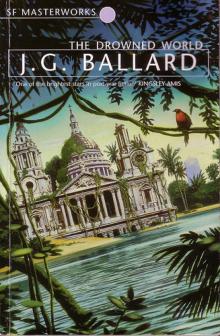 The Drowned World
The Drowned World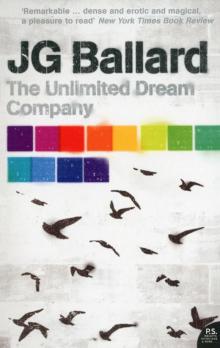 The Unlimited Dream Company
The Unlimited Dream Company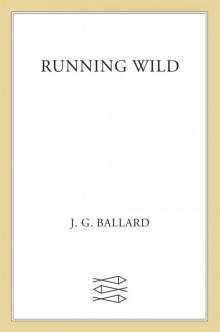 Running Wild
Running Wild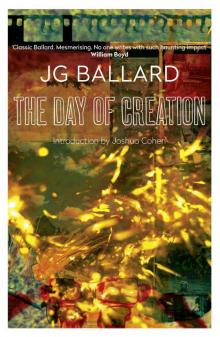 The Day of Creation
The Day of Creation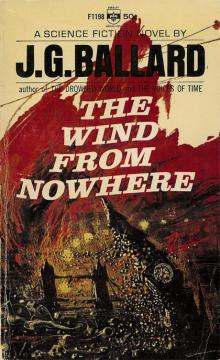 The Wind From Nowhere
The Wind From Nowhere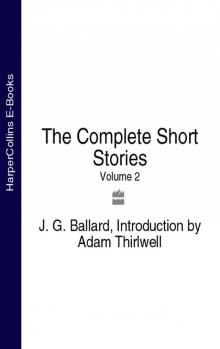 The Complete Short Stories, Volume 2
The Complete Short Stories, Volume 2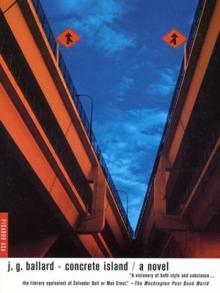 Concrete Island
Concrete Island Empire of the Sun
Empire of the Sun The Kindness of Women
The Kindness of Women Vermilion Sands
Vermilion Sands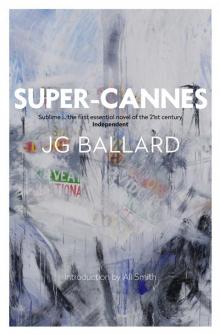 Super-Cannes
Super-Cannes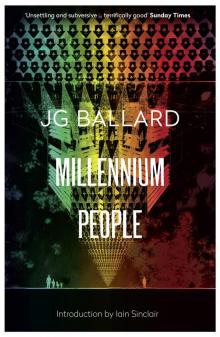 Millennium People
Millennium People The Complete Stories of J. G. Ballard
The Complete Stories of J. G. Ballard Crash
Crash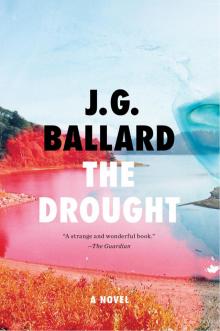 The Drought
The Drought The Atrocity Exhibition
The Atrocity Exhibition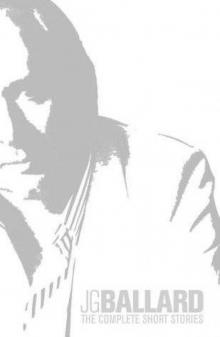 The Complete Short Stories: Volume 1
The Complete Short Stories: Volume 1 Miracles of Life: Shanghai to Shepperton: An Autobiography
Miracles of Life: Shanghai to Shepperton: An Autobiography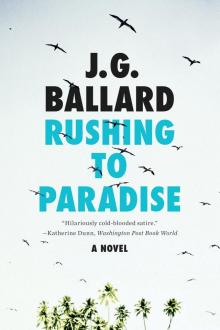 Rushing to Paradise
Rushing to Paradise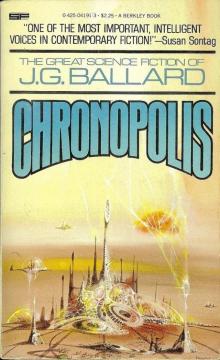 Chronopolis
Chronopolis Cocaine Nights
Cocaine Nights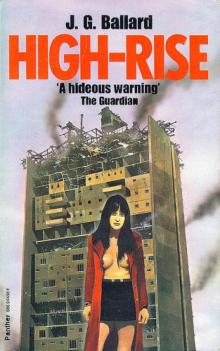 High Rise (1987)
High Rise (1987) The Complete Short Stories
The Complete Short Stories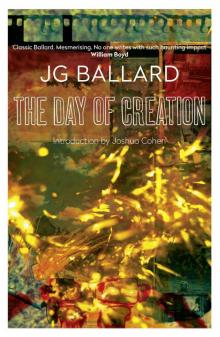 The Day of Creation (Harper Perennial Modern Classics)
The Day of Creation (Harper Perennial Modern Classics)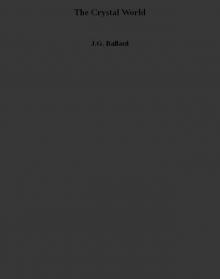 The Crystal World
The Crystal World